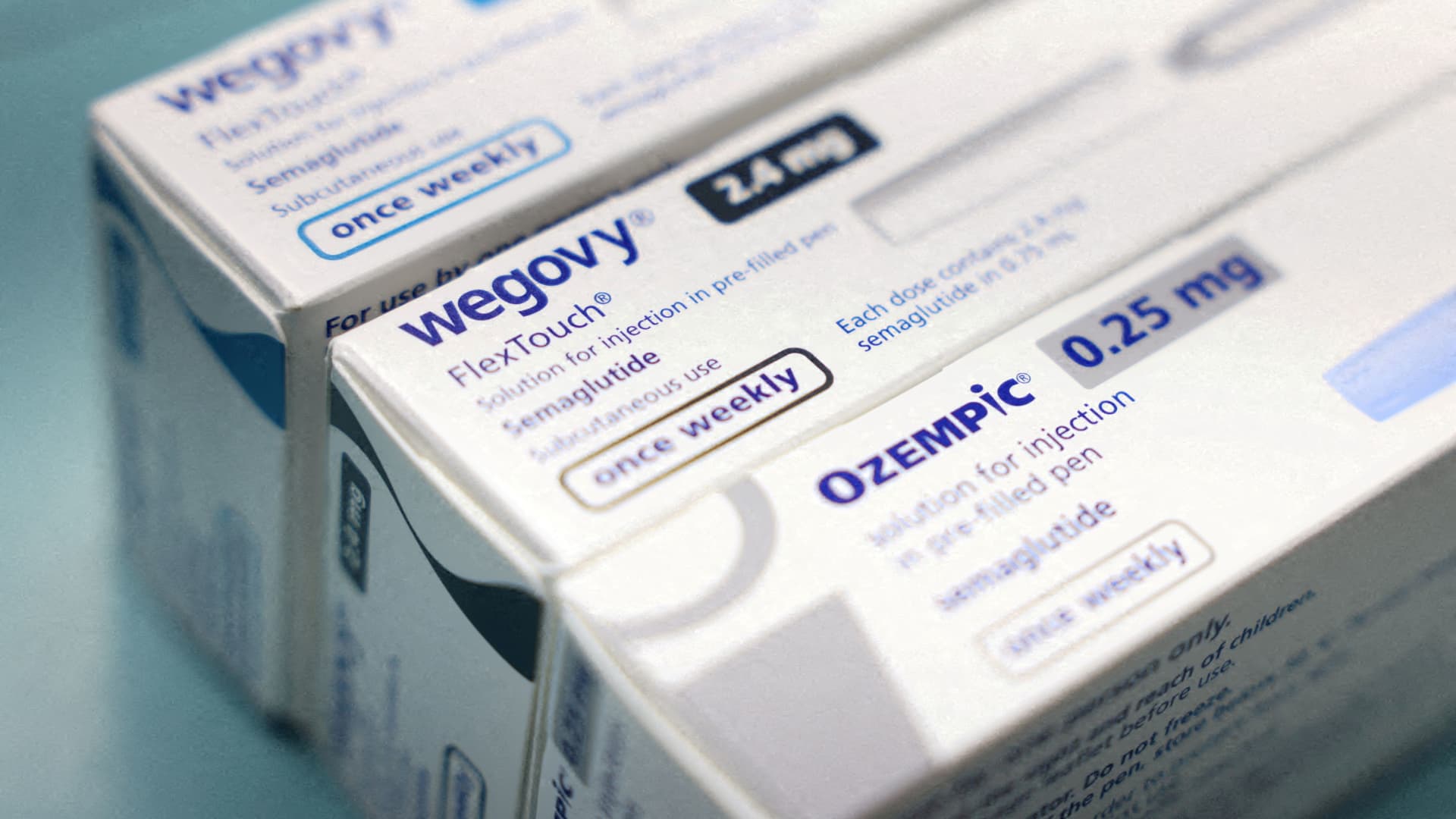
Boxes of Ozempic and Wegovy made by Novo Nordisk are seen at a pharmacy.
Hollie Adams | Reuters
Novo Nordisk on Tuesday asked the Food and Drug Administration to prevent compounding pharmacies from making unapproved and often cheaper versions of its popular weight loss injection Wegovy and diabetes treatment Ozempic, arguing that the medications are too complex for those manufacturers to make safely.
The FDA still has to make a final decision on whether to bar compounded versions of semaglutide, the active ingredient in Ozempic and Wegovy. In a statement, the agency said it is reviewing the petition and will respond directly to Novo Nordisk.
The move is Novo Nordisk’s latest attempt to crack down on potentially harmful copies of semaglutide after it filed 50 lawsuits against several clinics, compounding pharmacies and other manufacturers over the last year. It comes as the Danish drugmaker tries to ramp up the supply of semaglutide to meet unprecedented demand in the U.S.
Patients have turned to compounded versions of semaglutide amid intermittent U.S. shortages of the branded drugs, which carry hefty price tags of $1,000 per month before insurance and other rebates. Many health plans don’t cover semaglutide for weight loss, making compounded versions a more affordable alternative.
Compounded medications are custom-made alternatives to branded drugs designed to meet a specific patient’s needs. When a brand-name medication is in shortage, compounding pharmacies can prepare copies of the drug if they meet FDA requirements.
The active ingredient in Wegovy and Ozempic, semaglutide, has been in intermittent shortages over the past two years. The lowest dose of Wegovy is currently in short supply, but all other doses of the drug and Ozempic are listed as available, according to the FDA’s drug shortage database.
But Novo Nordisk late Tuesday nominated semaglutide to the FDA’s “Demonstrable Difficulties for Compounding” lists, which include complex drugs that compounders are not allowed to make, even during shortages, because they could potentially pose safety risks.
“Semaglutide products fit this description due to their inherent complexity and the potential dangers associated with attempting to compound them,” Novo Nordisk said in a statement.
The Danish drugmaker cited several risks with compounded versions of semaglutide, including unknown impurities, incorrect dosage strengths and instances where a compounded product contained no semaglutide at all.
“These drugs are inherently complex to compound safely, and the risks they pose to patient safety far outweigh any benefits,” Novo Nordisk said in a statement. The company said its “aim with this nomination is to ensure that patients receive only FDA-approved, safe, and effective semaglutide products.”
The FDA has previously warned about the risks of using compounded versions of so-called GLP-1s such as semaglutide. That refers to a buzzy class of medications that mimic hormones produced in the gut to tamp down a person’s appetite and regulate their blood sugar.
Earlier this month, the FDA said compounded versions of semaglutide and similar drugs can be risky for patients because they are unapproved, meaning the agency does not review their safety, effectiveness and quality before they are put out in the market.
The FDA in August also said it had received reports of patients overdosing on compounded semaglutide due to errors such as patients self-administering incorrect amounts of a treatment.
Both Wegovy and Ozempic are under patent protection in the U.S. and abroad, and Novo Nordisk and its rival Eli Lilly do not supply the active ingredients in their drugs to outside groups. The companies say that raises questions about what some manufacturers are selling and marketing to consumers.
Tirzepatide is the active ingredient in Eli Lilly’s weight loss injection Zepbound and diabetes treatment Mounjaro.
Like Novo Nordisk, Eli Lilly has sued several weight loss clinics, medical spas and compounding pharmacies across the U.S. over the past year.
Notably, the FDA took tirzepatide off its shortage list earlier in October after more than a year, even as some pharmacies say they are still struggling to stock up on the branded versions of that drug. A trade group representing some compounders sued the FDA, which led the agency to say it will reconsider its decision to remove tirzepatide from its shortage list.